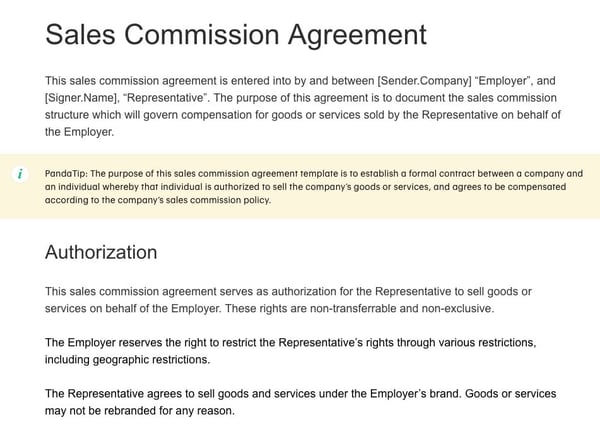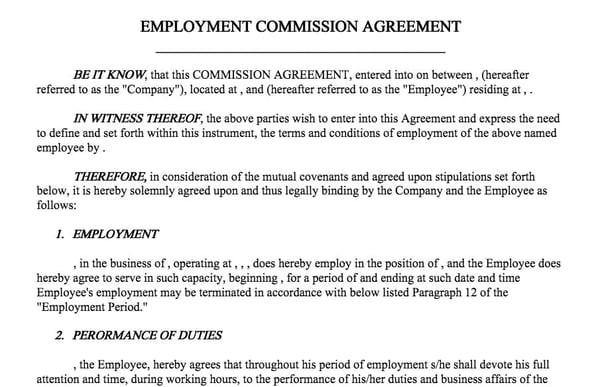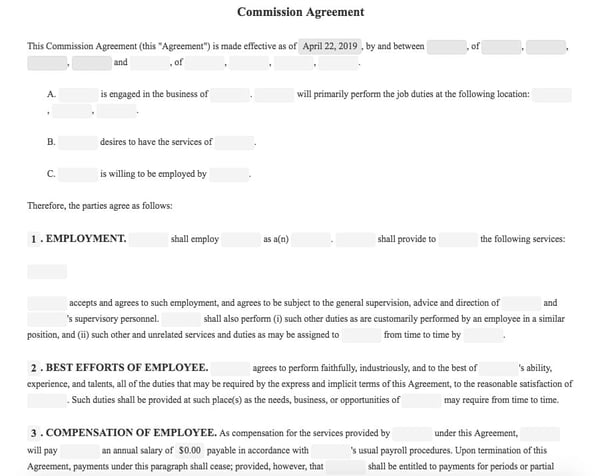Everything You Need to Know About Sales Commission in 2020 (For Reps & Leaders)

Did you know 43% of workers would be willing to leave their companies for a 10% salary increase?
Compensation is an important factor in attracting and retaining employees, especially in sales. Imagine if almost half of your sales team left the company because of a poorly designed compensation plan.
The results wouldn’t be pretty.
If your sales organization is struggling to strike a balance between company requirements and the compensation needs of employees, it’s likely time to reevaluate your compensation plan and commission structure.
As a salesperson, it’s valuable to know what types of commission plans are available and what salary and commission rates you should look for from an employer.
Luckily, I’ve compiled some resources for you to determine the best sales commission structure for your sales team or yourself. Ready to learn more?
In his book, “The High-Velocity Sales Organization“, sales strategist, Marc Wayshak, discusses how important compensation and commission is to your sales infrastructure. He offers a few tips to keep in mind when creating a commission structure:
1. Don’t cap salaries.
Capping salaries decreases the earning potential of your salespeople. Sales management should be supportive of their team and want individuals to make as much as possible in return for their hard work.
2. Do it right the first time.
In sales compensation, there isn’t room for do-overs. Introducing a new compensation plan moves your sales team’s goals and targets, diminishing your reps’ morale and motivation.
3. Keep it simple.
Make your compensation and commission plan clear. Not only will this make the commission structure easier to implement, but it will also ensure there aren’t any loopholes in the plan. A salesperson should be able to fill in the blanks: If I do X, then I will make $Y.
So, what commission structure should you choose? Well, there are a few to pick from. Common structures include:
1. Base Salary Plus Commission
With this plan, salespeople are provided a base salary with commission. The standard salary to commission ratio is 60:40, where 60% is fixed and 40% is variable.
This structure is ideal for companies where sales rep retention is critical to the success of the sales organization. The company is actively investing in the success of the rep while incentivizing their performance.
2. Straight Commission Plan
With this plan, sales reps’ income comes directly from the sales they earn. There is no base salary.
This structure is ideal for startups with not a lot of capital because the sales rep assumes the risk by giving up the security of a steady salary. High-performance sales reps can thrive in these environments, but be prepared to experience the difficulty of maintaining stability in roles with commission structures like this.
3. Relative Commission Plan
The relative commission plan is when a target or quota is set. Let’s say a salesperson has a quarterly quota of $90,000 and a quarterly commission of $10,000. If they meet 85% of the quota, they’ll receive 85% of the commission.
This is in addition to their base salary, which can help incentivize underperformers without causing the turnover that often happens with roles under a commission-only plan.
4. Absolute Commission Plan
This is when a commission is paid as a result of engaging in specific activities or meeting specific goals. For example, a salesperson might be paid $1,000 for each new customer. Like the relative commission plan, it can help incentivize underperformers, but the emphasis is less on revenue and more on activity.
5. Straight-Line Commission Plan
A straight-line commission plan rewards salespeople based on how much or little they sell. For example, if they reach 90% of their quota, they receive 90% of their commission. However, if they exceed quota, their commission increases. This is a great way to incentivize underperformers to meet quota as well as those who consistently meet quota to overperform.
6. Tiered Commission Plan
A tiered structure encourages reps to put in extra effort by providing higher commission as they hit substantial sales milestones. Here, reps could be paid increasing commissions as they meet their quota, exceed their quota, and continue to close more deals than they’re expected to.
This is ideal for organizations with salespeople who consistently reach (but not exceed) their goals while having a little more control on commission rates than the straight-line commission plan.
7. Territory Volume Commission Plan
With this commission structure, salespeople work with clients in clearly defined regions. And they’re paid on a territory-wide versus individual sale basis.
This is ideal for team-based organizations who are wanting to fortify in specific service areas.
This ultimate guide to sales compensation provides even more detail on sales commission structures and compensation plans. And it will help you determine which structure will work best for your company and sales team.
Averages for salary and commission allow sales leaders to see how their sales commission plan compares to the rest of their industry. And for salespeople, they can see how their sales compensation plan stacks up.
Average Sales Commission Rates by Industry
The wages below are from the BLS Occupational Employment Statistics (OES) survey. These wages reflect the median average pay for each industry. The commission rate will depend on the company and the commission structure they choose.
1. Wholesale and Manufacturing Sales Representatives
Median pay: $61,660
These kinds of sales representatives sell goods for wholesalers or manufacturers to businesses, government agencies, and other organizations. Their job security and livelihood is often almost entirely intertwined with the volume of merchandise they can sell. Their commission structure tends to reflect that. These reps are often paid with absolute or base salary plus commission plans.
2. Insurance Sales Agents
Median pay: $50,600
Insurance sales agents contact potential customers to sell different kinds of insurance. Agents spend time directly interfacing with clients, completing paperwork, and preparing presentations. They also fulfill other customer-facing and administrative responsibilities. Commission for this brand of sales is generally paid on a base salary plus commission basis. Commission percentages tend to vary by the type of insurance agents are selling.
3. Advertising Sales Agents
Median pay: $51,740
Advertising sales agents sell advertising space to businesses and individuals. They often work across a variety of industries and media, including advertising agencies, radio, television, and Internet publishing. Advertising sales agents often have strict quotas and receive a commission for meeting or exceeding them.
4. Real Estate Brokers and Sales Agents
Median pay: $50,300
Real estate brokers and sales agents help clients buy, sell, and rent properties. Every state requires real estate sales professionals to be licensed. That could mean completing courses or passing a state-specific exam. They’re often self employed, so many have the flexibility to define their own commission structure.
5. Securities, Commodities, and Financial Services Sales Agents
Median pay: $64,120
Securities, commodities, and financial services agents buy and sell securities or commodities in investment and trading firms. They can also provide financial services to businesses and individuals. Some advise customers about stocks, bonds, mutual funds, commodities, and market conditions. These salespeople often charge flat-rate commissions either per share or per trade.
6. Sales Representatives, Services, SAAS, Business Support, Telecommunications, All Other
Median pay: $54,550
This category of sales encompasses salespeople in positions and industries in a wide variety of service-based businesses, including business support, technical consulting, electronics, telecommunications, computer systems and electronics, and software as a service. Given the wide range of industries and companies encompassed in this category, it can be hard to identify its most common commission structure.
7. Door-to-Door Sales Workers, News and Street Vendors, and Related Workers
Median pay: $26,430
Several different kinds of salespeople fall under this category, including professionals in telecommunications, residential building construction, and subscription programming. Given the wide range of industries and companies encompassed in this category, it can be hard to identify its most common commission structure.
8. Retail Salespersons
Median pay: $25,250
Retail sales refers to the occupation in which merchandise (such as clothing, furniture, or appliances) are sold in a retail brick-and-mortar environment. These environments include everything from general merchandise stores to dealers specializing in specific wares such as sporting goods or musical instruments.
Since success is often dependent on foot traffic rather than sales activity, retail salespersons are often compensated by a base salary only. However, retail environments with high-ticket items often pay flat commission rates.
9. Sales and Related Workers, All Other
Median pay: $33,220
This category of sales encompasses salespeople in positions and industries that don’t fall into any of the ones mentioned above. This can include roles at automobile dealerships, in non-depository credit intermediation, and with food and beverage retailers. The range of roles that fall into this category is broad, so the variety the commission structures used tends to be as well.
Before agreeing to accept a sales job at a company, you should have a clear outline and understanding of its commission structure and compensation plan. The sales commission agreement should tell you everything you need to know about the commission and salary you’re going to make.
Sales Commission Agreement
What is a sales commission agreement? It includes a salesperson’s terms of employment. The agreement also outlines the compensation structure and working relationship between employee and employer.
In short, it allows both the salesperson and their employer to agree on compensation, commission, and job responsibilities. Here are the key elements that should be included in a sales commission agreement.
1. Authorization
This section gives the okay for the salesperson to sell products or services on behalf of their employer. The employer often limits the selling by restricting the regions or territories in which the offerings are sold and prohibiting the rebranding and reselling of their products.
2. Documentation
The salesperson must agree to use documentation and tools that are approved by the company to keep track of their sales activities. For example, this would include CRM databases, software, forms, etc.
3. Non-Compete Clause
A non-compete clause requires the salesperson to refrain from representing or selling on behalf of a competitor for a period of time after leaving their employer.
4. Non-Disclosure Clause
The non-disclosure clause ensures that the employee agrees to refrain from sharing confidential information or intellectual property.
5. Commission Structure
This is where you share the details of the commission structure. After reading this section, the employee and employer should have a clear understanding of:
The compensation structure (e.g., commission, performance incentives, bonuses)
When a commission is earned
When commissions are paid
Consequences of cancellations, refunds, or default of payments from customers
6. Agreement
Both the salesperson and their employer agree to the details of the sales commission agreement by signing and dating the document.
For additional recommendations and insight, consult your legal team or seek out the advice of a lawyer to help you carefully craft your sales commission agreement.
Strategic Business Plan Examples
If you need some help developing a sales commission agreement or strategic business plan, these templates are a great way to get started.
1. Sales Commission Agreement Template from PandaDoc
Edit and customize this sales commission agreement template to fit your needs. This template can be signed by your recipients, and you’ll be able to track the document’s opens and views.

2. Sales Commission Agreement Template from FormSwift
This sales commission agreement template builder will help you outline the working relationship between employee and employer. It includes general information (e.g., address and phone number), commission structure, documentation, and non-compete and non-disclosure clauses.

3. Sales Commission Agreement Template from RocketLawyer
With this fill-in-the-blank sales commission agreement, you’re able to quickly plug in the details for your document. And it includes a progress bar to show you how much more of the agreement needs to be completed.

With a well-planned sales commission structure, you’ll attract top employees and retain them. And clearly outlined compensation plans will make it easier for employees to understand expectations and earn their commission.
Editor’s note: This post was originally published in January 2020 and has been updated for comprehensiveness.
![]()
Original Source: blog.hubspot.com
Visited 685 Times, 1 Visit today
